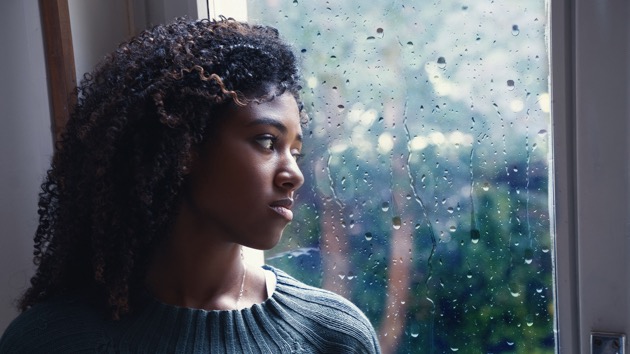By KATIE KINDELAN, ABC News(NEW YORK) — Meg Wood, a 31-year-old living in Philadelphia, said she has suffered from seasonal depression for as long as she can remember.This year, amid a pandemic that has experts warning of a growing mental health crisis, Wood said she has struggled more than ever with her depression that heightens in the dark months of winter.”A lot of the things I have learned to do to cope with mental health are more difficult because of the pandemic,” Wood told Good Morning America. “For example, one of the things that happens during my seasonal depression is I withdraw and don’t really talk to my friends. In normal times my friends would check up on me, but that’s not as easy now.””And there’s not only depression but anxiety as well because you can’t get out and let it run free,” she said. “You’re just kind of home and all of your anxious thoughts are bouncing off walls.”Wood is not alone in feeling the effects of seasonal depression more severely this year during the coronavirus pandemic, experts say.”The numbers are just bearing this out, that there are so many stressors going on because of the pandemic, whether that’s fear of getting sick or anxiety related to what you can or can’t do that impacts you socially or financially or impacts your family, uncertainty as to when this may end, opportunities missed and milestones missed,” said Dr. Gail Saltz, a psychiatrist and best-selling author. “Certainly, if you’re more likely to struggle this time of year, those stressors can definitely ratchet it up enough that it becomes a serious problem.”The “winter blues” is defined as a short period of time when a person may feel down or not like themselves due to weather changes, like in the fall and winter when daylight hours are shorter, according to the National Institutes of Health (NIH).A more serious condition, defined by significant changes in mood and behavior when the seasons change, is called seasonal affective disorder (SAD), a type of depression, according to the NIH. SAD includes symptoms like feeling depressed, loss of interest in activities and changes in appetite, weight and sleep that can usually last four to five months.About 5% of adults in the U.S. experience SAD and it is more common among women than men, according to the American Psychiatric Association (APA).Whether you are struggling with pandemic-driven “winter blues” or a more serious case of SAD, there are things that can help.Here are five tips from Saltz and Dr. Samar McCutcheon, a psychiatrist and clinical assistant professor at The Ohio State University.1. Schedule 1-on-1 time with friends and family.Making an effort to connect with loved ones may seem trying during a global pandemic that makes it so hard to do so in-person, but both Saltz and McCutcheon say it is crucial for people struggling with their mental health.”I think you just have to be blatant about it this year and say, ‘I’m having a hard time. I know that I don’t always reach out but I know that being with other people, being with you, is a help to me, even if we can’t do it the same way,"” said Saltz. “Nobody’s going to be shocked. They’re probably going to say, ‘Me too.’”Saltz said one-on-one time might be even more valuable for people during this time, whether that’s scheduling a socially-distanced outdoor walk, having a Zoom or phone call or doing an activity together virtually, like baking or having a coffee.2. Don’t be afraid to see a therapist.“If you’re thinking ‘should I see a therapist,’ probably the answer is yes,” said Saltz. “When you start thinking about it, then you’re struggling.”One silver lining of the pandemic is that it has opened more avenues to therapy, including telemedicine, apps and free mental health resources, according to Saltz.There are also specific therapies that can be used specifically for SAD, including cognitive behavioral therapy (CBT), noted McCutcheon.3. Put down the wine glass.While it may be tempting to drink a glass of wine or a cocktail on a dark winter night, resisting the urge to drink can ease the effects of seasonal depression and SAD, according to both McCutcheon and Saltz.”Unfortunately, things like alcohol are actually depressants,” said McCutcheon, while Saltz noted that alcohol tends to “intensify whatever feeling you’re having.”For context, excessive drinking is defined by the Centers for Disease Control and Prevention (CDC) as consuming eight or more drinks per week for women and 15 or more drinks per week for men.4. Get outside and de-stress.Because seasonal depression can be brought on by the lack of sunlight, it is more important than ever to get outside in the sunshine, ideally in the morning when the sun is strongest, according to Saltz.”Being out when the sun is up and being outside for some time, for as much as possible, is a good thing,” she said. “If you can do that each late morning when the sun is really up, that’s good.”Other healthy behaviors are also important to maintain, including maintaining a healthy diet, getting seven to nine hours per night of sleep and finding daily activities that can help lower stress, including deep breathing aerobic exercise and meditation, according to Saltz.5. Try light therapy.Light therapy, which uses a machine to mimic sunlight in an indoor setting, is also a great option, but it should be done only in consultation with a medical professional, according to both Saltz and McCutcheon.”Any of the interventions that we use will take at least two weeks or as long as four weeks,” said McCutcheon. “There’s no rapid or overnight intervention that’s going to stop the symptoms.”If you are in crisis or know someone in crisis, call the National Suicide Prevention Lifeline at 1-800-273-TALK (8255) or contact the Crisis Text Line by texting HOME to 741741. You can reach Trans Lifeline at 877-565-8860 (U.S.) or 877-330-6366 (Canada) and The Trevor Project at 866-488-7386.Copyright © 2020, ABC Audio. All rights reserved.












